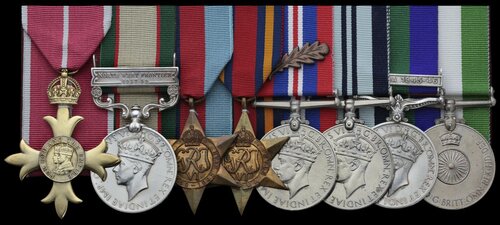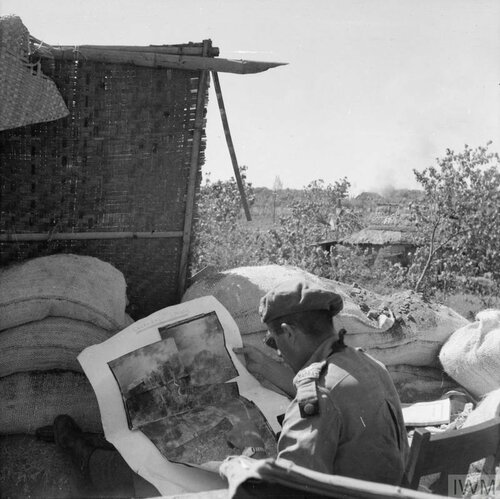Auction: 22001 - Orders, Decorations and Medals
Lot: 563
A rare South East Asia 1945-46 operations Battalion CO's O.B.E. group of eight awarded to Lieutenant-Colonel A. T. Scott, Indian Army, who led the 1/3rd Madras Regiment at the Battle of Surabaya
The Most Excellent Order of the British Empire, O.B.E. (Military) Officer’s 2nd Type breast Badge, silver-gilt; India General Service 1936-39, 1 clasp, North West Frontier 1937-39 (Capt. A. T. Scott. 1-12 F.F.R.); 1939-45 Star; Burma Star; War Medal 1939-45, with M.I.D. oak leaf; India Service Medal 1939-45; General Service 1918-62, 1 clasp, S.E. Asia 1945-46 (Lt. Col. A. T. Scott. 3 Madras. R.); Indian Independence Medal 1947, unnamed, the G.S.M. with officially corrected rank and initials, good very fine (8)
O.B.E. London Gazette 28 November 1946:
‘For gallant and distinguished service in South-East Asia.’
M.I.D. London Gazette 5 April 1945 and 9 May 1946 (Burma).
Alastair Thame Scott, who was born in 1910, was commissioned into the Indian Army on 31 January 1930. He served with the 1-12th Frontier Force Rifles (Corps of Guides) on the North West Frontier operations 1937-39. By the time of the Second World War, Scott he held senior command in the 1939-45 War, ultimately serving as a Lieutenant-Colonel and C.O. of the 1/3rd Madras Regiment in the advance through Burma in early 1945. In that period he was present at the crossing of the Irrawaddy that March, and in all of the fighting up to Paungga in the following month, including the capture of Point 1682, near Sabauk. No surprise then, that he ended the War with a brace of 'mentions'.
Some 4,000 British troops had arrived at Surabaya on 25 October 1945 and Brigadier Mallaby demanded that the Indonesians disarm and surrender the city. Three days later they began advancing into the city and were suddenly attacked by some 20,000 rebels. The British were driven back with heavy losses: Brigadier Mallaby was killed whilst trying to negotiate a ceasefire in controversial circumstances as were over 200 of his men. This defeat precipitated a full scale revolt against the British that spread throughout Java.
The allies sent reinforcements into the city supported by the Royal Navy together with tanks and artillery and immediately commenced shelling the city whilst the RAF bombed the rebel strongpoints. After three days of street fighting the city was re taken but at an enormous cost to both the allies and the Indonesians. As recalled by Sukarno:
'The city itself was in pandemonium. There was bloody hand-to-hand fighting on every street corner. Bodies were strewn everywhere. Decapitated, dismembered trunks lay piled one on top of the other...Indonesians were shooting and stabbing and murdering wildly.'
Scott was ordered with the 1/3rd Madras Regiment to Surabaya in November 1945 and a gruelling series of patrols and engagements ensued, but often at great cost to the opposition. Indeed their War Diary has Scott reporting the demise of around 250 of the enemy in December 1945 alone, a tally that was no doubt substantially increased before he and his men were withdrawn in April 1946.
Despite the military defeat suffered by the Republicans, the battle and defence mounted by the Indonesians galvanised the nation in support of independence and helped garner international attention. It also had the effect of convincing Britain that wisdom lay on the side of neutrality in the Revolution. In fact Britain would support the Republican cause in the United Nations a few years later.
Scott learned of his richly-deserved O.B.E. several months later, whilst he appears to have commanded 13th Signal Regiment (Radio) from 1963-66. Scott died at Edinburgh on 13 June 1967; sold together with a bound book with copied reserch besides a (possibly posed) image of the Lieutenant-Colonel studying his maps before the Battle.
Subject to 20% VAT on Buyer’s Premium. For more information please view Terms and Conditions for Buyers.
Sold for
£2,600
Starting price
£750







